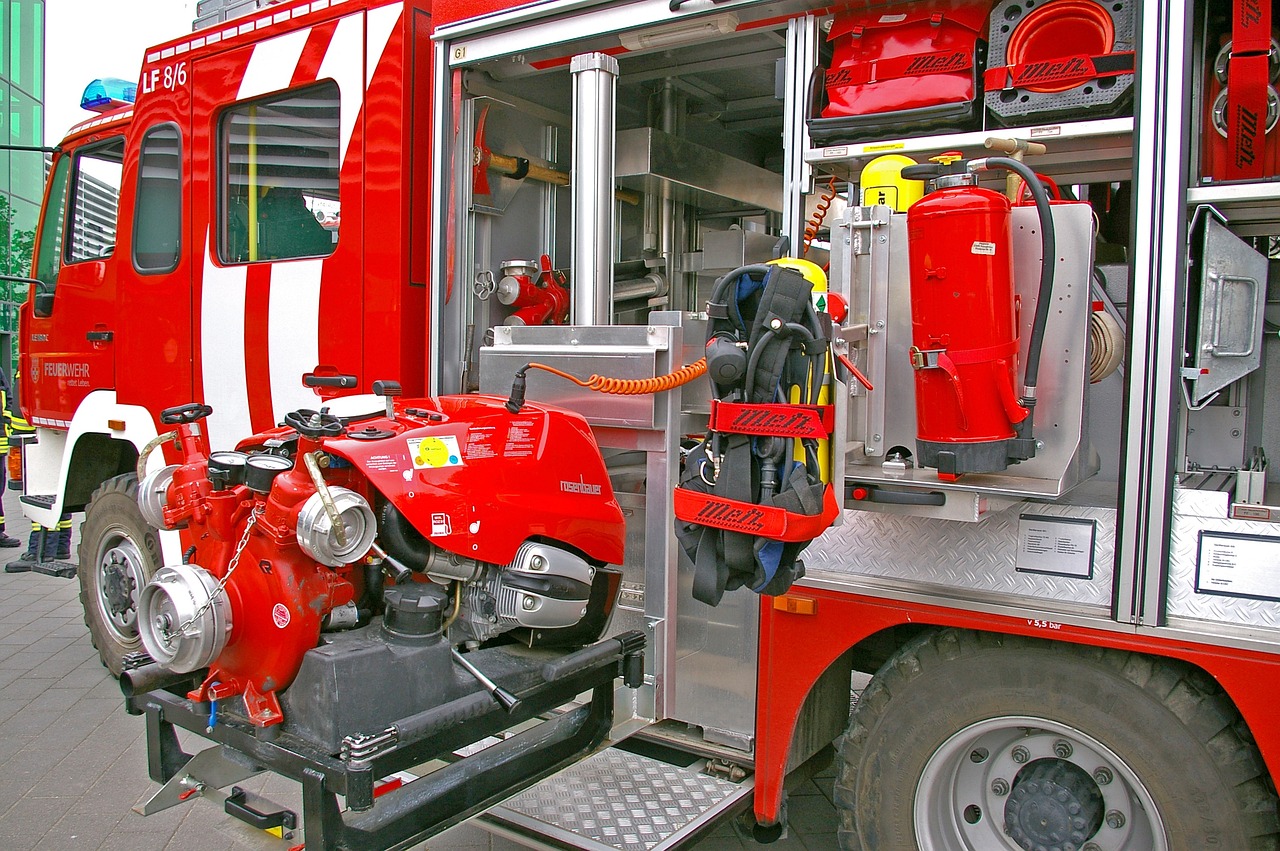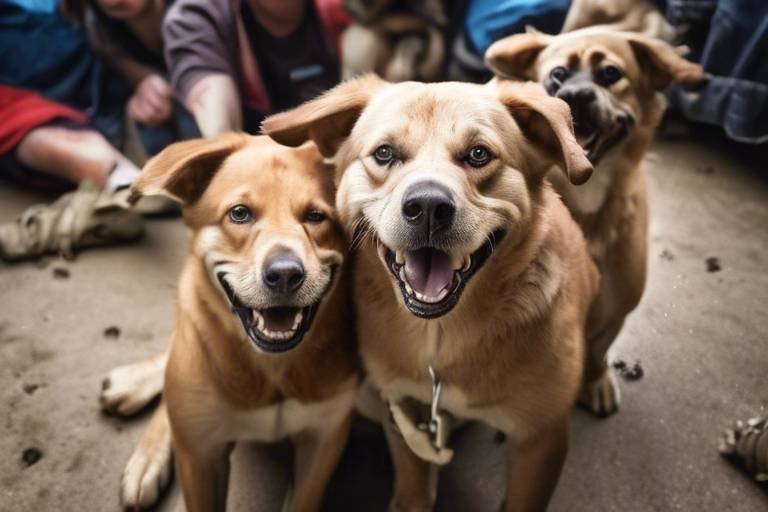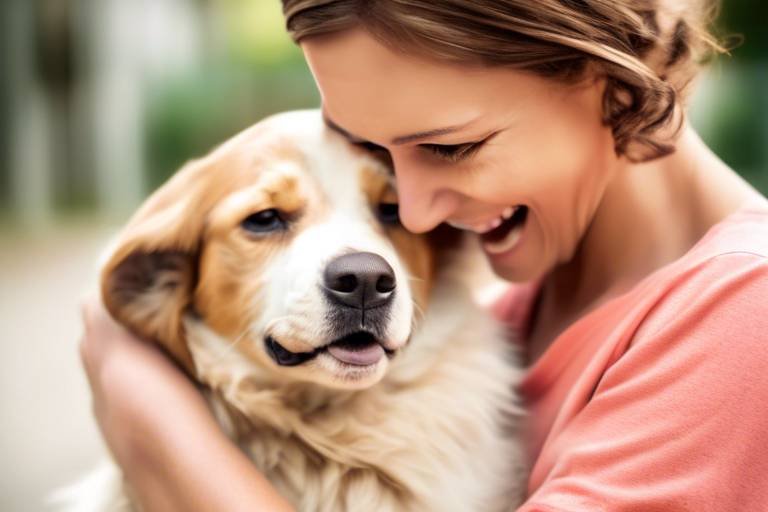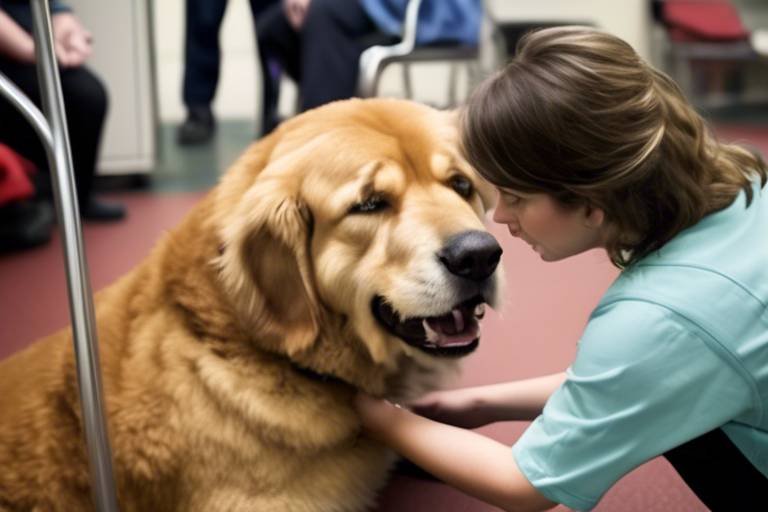How to Make a Difference - Supporting Local Rescues
Every day, countless animals find themselves in dire situations, abandoned or abused, waiting for a chance at a better life. Supporting local rescues is not just a noble act; it’s a lifeline for these vulnerable creatures. Imagine being able to change the course of an animal's life simply by lending a helping hand. Whether you’re a lifelong animal lover or just someone looking to make a positive impact, there are numerous ways to contribute to local rescues. This article dives into the heart of community involvement, emphasizing how each individual can play a crucial role in transforming the lives of animals and, in turn, enriching our society. So, how can you step up and make a difference?
Local rescues are the unsung heroes of the animal welfare world. They operate tirelessly to provide shelter, medical care, and rehabilitation for animals that have faced abandonment or cruelty. Think of them as the first responders for animals in distress, working around the clock to ensure that every creature has a chance at a loving home. Their efforts extend beyond just rescue; they also promote responsible pet ownership, educating the community about the importance of spaying and neutering, vaccinations, and proper care. In a world where animals often get overlooked, these organizations shine a light on the need for compassion and action.
One of the most impactful ways to support local rescues is by volunteering your time. It’s not just about giving back; it’s about forming connections and witnessing the joy of animals finding their forever homes. When you volunteer, you become part of a community that shares the same passion for animal welfare. Whether you’re helping with animal care, administrative tasks, or organizing events, your time can make a significant difference. Plus, volunteering can be incredibly fulfilling! You’ll meet like-minded individuals, learn new skills, and experience the heartwarming moments that come from helping those in need.
There are a variety of roles available for volunteers, each contributing uniquely to the mission of local rescues. Some popular opportunities include:
- Dog Walking: Taking dogs for walks not only gives them exercise but also helps with their socialization.
- Fostering Animals: Providing a temporary home for animals in need helps reduce overcrowding in shelters.
- Assisting with Adoption Events: Help connect animals with potential adopters by sharing their stories.
Each role is essential, and no contribution is too small. Every little bit helps improve the quality of life for these animals.
Walking dogs and providing socialization is crucial for their well-being. Imagine a dog cooped up in a kennel, longing for a simple stroll in the park. By volunteering to walk dogs, you’re not just giving them exercise; you’re also helping them become more adoptable. Regular walks improve their behavior, reduce anxiety, and make them more comfortable around people and other animals. It’s a win-win situation: you enjoy some fresh air and companionship, while the dogs get the social interaction they desperately need.
Fostering is one of the most rewarding experiences you can have as a volunteer. It involves caring for animals in your home until they find permanent homes. This not only alleviates overcrowding in shelters but also allows for individualized attention and training. Think of it as giving these animals a taste of a loving home, even if it’s temporary. You’ll witness their transformation, from scared and timid to happy and playful, and knowing you played a part in that journey is incredibly fulfilling.
Raising funds and donating supplies are essential for the survival of local rescues. Financial contributions help cover veterinary costs, food, and shelter expenses, ensuring that animals receive the care they need. Every dollar counts! You might be surprised to learn that even small donations can add up to make a significant impact. Consider organizing a fundraiser, whether it’s a bake sale, a charity run, or an online crowdfunding campaign. The community’s support can be a game-changer for these organizations.
Community events, such as adoption drives and fundraising fairs, can significantly boost awareness and support for local rescues. These events foster community spirit while helping to find homes for animals in need. Imagine a bustling fair filled with families, laughter, and the joy of finding a new furry friend. When people come together for a common cause, it creates a ripple effect of positivity and support.
A well-organized adoption event can lead to numerous successful adoptions. Key elements include:
- Promoting the Event: Use social media, flyers, and word of mouth to spread the word.
- Providing Information: Ensure potential adopters have all the information they need about the animals available.
- Creating a Welcoming Atmosphere: Make the event fun and engaging to attract more visitors.
With the right planning, these events can change lives, both for the animals and the families who adopt them.
Partnering with local businesses can enhance fundraising efforts. Businesses can sponsor events, donate items for auctions, or provide discounts for customers who adopt pets, creating a win-win situation for everyone involved. It’s amazing how a little collaboration can go a long way. By engaging local businesses, you not only raise funds but also build a community that cares about animal welfare.
Q: How can I find local rescues in my area?
A: A quick online search or checking social media platforms can help you locate rescues nearby. Local animal shelters often have connections to rescues as well.
Q: Do I need special skills to volunteer?
A: No special skills are required! Most rescues provide training, and your enthusiasm and willingness to help are what truly matter.
Q: Can I volunteer if I have a full-time job?
A: Absolutely! Many rescues offer flexible volunteering hours that can fit around your schedule.
Q: What items can I donate to local rescues?
A: Common donations include pet food, toys, blankets, and cleaning supplies. Check with the rescue for their specific needs.

Understanding Local Rescues
This article explores various ways individuals can contribute to local animal rescues, highlighting the importance of community involvement and the positive impact it can have on both animals and society.
Local rescues are the unsung heroes of the animal welfare world. They step in where others might turn away, offering a safe haven for animals that have been abandoned, abused, or neglected. These organizations operate on the front lines, providing not only shelter but also essential medical care and rehabilitation for these vulnerable creatures. Imagine walking into a facility filled with wagging tails and hopeful eyes; it's a heartwarming experience that reminds us of the resilience of these animals and the compassion of the people who care for them.
But what exactly do local rescues do? They work tirelessly to find loving homes for animals while promoting responsible pet ownership within the community. This involves educating the public about the importance of spaying and neutering, the benefits of adopting rather than shopping for pets, and the responsibilities that come with pet ownership. By fostering a culture of compassion and understanding, local rescues not only change the lives of animals but also enrich the communities they serve.
Local rescues often rely on a network of volunteers and donations to keep their operations running smoothly. They face numerous challenges, from overcrowding to limited resources, yet their dedication never wavers. Many of these organizations are small, grassroots efforts that depend heavily on the support of the community. When you contribute your time or resources, you're not just helping animals; you're also strengthening the bonds within your community. Each act of kindness creates a ripple effect, inspiring others to get involved and make a difference.
To give you a clearer picture of how local rescues operate, here’s a quick overview:
| Role | Description |
|---|---|
| Shelter | Providing a safe and loving environment for animals in need. |
| Medical Care | Offering necessary veterinary services, including vaccinations and spaying/neutering. |
| Adoption Services | Finding permanent homes for animals through screening and matchmaking. |
| Community Education | Promoting responsible pet ownership and animal welfare awareness. |
In conclusion, understanding the role of local rescues is the first step towards making a meaningful impact. These organizations are more than just shelters; they are lifelines for countless animals and a source of hope for communities. By getting involved, you can help ensure that these rescues continue their vital work, creating a brighter future for both animals and people alike.
Volunteering at a local rescue is a fulfilling way to make a difference. By donating your time, you can help with animal care, administrative tasks, and event organization, directly impacting the lives of animals in need.
There are various roles available for volunteers, including dog walking, fostering animals, and assisting with adoption events. Each role contributes uniquely to the rescue's mission and helps improve the animals' quality of life.
Walking dogs and providing socialization are crucial for their well-being. This activity helps them become more adoptable by improving their behavior and reducing anxiety, making them more comfortable around people and other animals.
Fostering is a rewarding experience that involves caring for animals in your home until they find permanent homes. This not only helps alleviate overcrowding in shelters but also allows for individualized attention and training.
Raising funds and donating supplies are essential for the survival of local rescues. Financial contributions help cover veterinary costs, food, and shelter expenses, ensuring that animals receive the care they need.
Community events, such as adoption drives and fundraising fairs, can significantly boost awareness and support for local rescues. These events foster community spirit while helping to find homes for animals in need.
A well-organized adoption event can lead to numerous successful adoptions. Key elements include promoting the event, providing information about the animals, and creating a welcoming atmosphere for potential adopters.
Partnering with local businesses can enhance fundraising efforts. Businesses can sponsor events, donate items for auctions, or provide discounts for customers who adopt pets, creating a win-win situation for everyone involved.
- How can I find a local rescue in my area? Check online directories or social media groups dedicated to animal welfare.
- What items do local rescues need the most? Commonly needed items include food, blankets, toys, and cleaning supplies.
- Can I volunteer if I have no experience with animals? Absolutely! Many rescues provide training for new volunteers.

Volunteering Your Time
Volunteering at a local animal rescue is not just about giving back; it's about transforming lives—both animal and human. When you roll up your sleeves and dedicate your time, you become a crucial part of a larger mission to save those who cannot speak for themselves. Imagine walking into a shelter filled with wagging tails and hopeful eyes, each animal yearning for a second chance. By volunteering, you can be that beacon of hope!
Whether you're a seasoned animal lover or just someone looking to make a positive impact in your community, there are countless ways to contribute. Volunteering allows you to engage directly with the animals, providing them with the love and attention they desperately need. It's not just about the tasks at hand; it's about building connections and understanding the stories behind each furry face. Plus, it's a fantastic way to meet like-minded individuals who share your passion for animal welfare.
Here are some of the most rewarding volunteer opportunities you might encounter:
- Animal Care: Assisting with feeding, grooming, and cleaning can make a significant difference in the daily lives of the animals.
- Administrative Support: Help with paperwork, scheduling, and organizing events to keep the rescue running smoothly.
- Event Organization: Plan and execute events that raise awareness and funds for the rescue.
Each role you take on contributes uniquely to the rescue's mission. For instance, spending time with animals not only helps with their socialization but also enhances their chances of being adopted. Imagine the joy of seeing a previously shy dog blossom into a confident companion, all because you took the time to walk, play, and love them.
Moreover, volunteering at a local rescue can be a fantastic way to learn new skills. You might discover a knack for event planning or find yourself honing your communication skills while interacting with potential adopters. The experience can be incredibly enriching, providing you with a sense of fulfillment that few other activities can offer.
So, if you're wondering how you can make a difference today, consider reaching out to a local rescue. They are often in need of passionate individuals ready to lend a hand. Remember, every hour you dedicate is a step toward creating a better life for these animals. And who knows? You might just find that your heart grows a little bigger with each wagging tail you encounter.
Types of Volunteer Opportunities
When it comes to volunteering at local rescues, the opportunities are as diverse as the animals themselves. Each role you take on can make a significant difference in the lives of these furry friends. Whether you're a dog lover, a cat enthusiast, or even someone who enjoys working behind the scenes, there's a spot for you. Let's dive into some of the rewarding volunteer opportunities available.
One of the most popular ways to get involved is through dog walking. Imagine this: a dog, cooped up in a kennel, longing for the fresh air and the feel of grass beneath its paws. By volunteering to walk these dogs, you not only provide them with much-needed exercise but also help them socialize. This experience can be transformative for them, making them more adoptable as they learn to interact positively with people and other animals.
Another fulfilling option is fostering. This role is especially vital as it allows you to take in animals who need a temporary home. Picture yourself nurturing a scared puppy or a shy kitten in your living room, giving it the love and attention it deserves until it finds its forever family. Fostering not only alleviates overcrowding in shelters but also allows for personalized training and socialization, which can drastically improve an animal's chances of adoption.
Additionally, many rescues need help with administrative tasks. If you're more of a behind-the-scenes person, you can assist with data entry, social media management, or event planning. Your skills can help streamline operations, ensuring that the rescue runs smoothly and efficiently. This support is crucial, as it frees up resources for the direct care of the animals.
Furthermore, volunteering at adoption events can be a blast! These events are not just about finding homes for animals; they’re also about connecting with the community. As a volunteer, you might help set up, greet potential adopters, or provide information about the animals. Your enthusiasm can make a lasting impression, encouraging families to consider adopting a new furry member.
In summary, whether you’re walking dogs, fostering pets, assisting with administrative work, or engaging with the community at adoption events, every effort counts. Each role contributes uniquely to the mission of local rescues, enhancing the quality of life for the animals and helping them find loving homes. So, why not step up and become a part of this heartwarming journey?
- What qualifications do I need to volunteer? Most rescues welcome anyone who has a passion for animals. Some roles may require specific skills or training, but many just need a loving heart and a willingness to help.
- How much time do I need to commit? This varies by role and organization. Some opportunities may require a few hours a week, while others might be more flexible.
- Can I volunteer with my family? Absolutely! Many rescues encourage family volunteering, as it can be a great way to bond and teach kids about compassion for animals.
- What if I can’t commit to regular volunteering? Even one-time events or occasional help can make a significant impact. Many rescues appreciate any support they can get!
Dog Walking and Socialization
Walking dogs is not just a chore; it's a vital part of their well-being and an opportunity to bond with them. Imagine being cooped up in a small room all day, with no chance to stretch your legs or enjoy the fresh air. That’s how dogs feel when they’re confined to a shelter or a small space. By volunteering to walk these dogs, you’re not only providing them with exercise but also giving them a chance to explore the world outside their kennel. This simple act can significantly improve their mood and behavior, making them more adoptable.
Socialization is equally important. Dogs, like humans, thrive on social interaction. When you take them out for a walk, they encounter different sights, sounds, and smells, which helps to stimulate their minds. Meeting other dogs and people is crucial for their development as well. It teaches them how to behave in various situations, reduces anxiety, and helps them become more comfortable around strangers. In essence, you’re helping to prepare them for their future homes by exposing them to real-world experiences.
Moreover, during these walks, you have the chance to observe the dog's personality and behavior. Are they shy? Do they get excited around other dogs? This information can be invaluable for the rescue organization when they are trying to find the perfect match between a dog and a potential adopter. You become a crucial part of their journey, helping to paint a picture of what life would be like with them.
To make the most of your dog walking experience, consider these tips:
- Be Patient: Some dogs may be nervous or overly excited. Take your time to help them adjust.
- Use Positive Reinforcement: Treats or praise can encourage good behavior during walks.
- Stay Aware: Always be mindful of your surroundings and be prepared for unexpected encounters.
In conclusion, dog walking and socialization are not just beneficial for the dogs; they can be incredibly rewarding for you as a volunteer. Each walk can be an adventure filled with joy, laughter, and a sense of accomplishment as you contribute to the well-being of these amazing animals. So, grab that leash and get ready to make a difference, one paw at a time!
Q1: How often should I walk the dogs at the rescue?
A1: Ideally, dogs should be walked at least once a day, but more frequent walks can help keep them healthy and happy.
Q2: What should I do if a dog is aggressive during a walk?
A2: It's important to remain calm. If you feel uncomfortable, it's best to return the dog to the shelter and inform the staff about the behavior.
Q3: Can I take multiple dogs for a walk at once?
A3: This depends on your experience and the dogs' behavior. It's often safer to walk one dog at a time unless you are confident in handling multiple dogs.
Q4: What supplies do I need to bring when walking dogs?
A4: Always bring a leash, waste bags, and treats. Depending on the dog, you might also need a muzzle for safety.
Fostering Animals
Fostering animals is not just a temporary act of kindness; it’s a transformative experience that can change the lives of both the animal and the foster caregiver. When you open your home to a furry friend in need, you become a crucial part of their journey toward finding a forever home. Think about it: every time you take in a dog or cat, you’re providing them with a safe space to heal, learn, and grow. It’s like giving them a second chance at life!
Imagine a scared, timid dog who has faced neglect or abuse. By fostering, you can help this dog learn to trust again, to enjoy the simple pleasures of life, like a warm bed, a full bowl of food, and the gentle touch of a loving hand. The impact you make is profound, not only for the animal but also for the community, as each fostered pet that finds a home opens up space in the rescue for another animal in need.
Moreover, fostering allows you to develop a deeper understanding of animal behavior. You get to witness firsthand how different environments affect a pet’s personality and well-being. This knowledge can be shared with potential adopters, helping them make informed decisions when choosing a pet. It’s a win-win situation! You not only help the animal but also become an advocate for them, sharing their story and personality with the world.
Now, you might be wondering what it takes to become a foster caregiver. While the specifics can vary by rescue organization, here are some common responsibilities:
- Providing food, water, and shelter.
- Administering any necessary medications.
- Socializing the animal and helping with training.
- Taking the animal to veterinary appointments.
- Promoting the animal for adoption through social media and events.
Fostering can also be a flexible commitment. Some rescues allow short-term fostering for specific situations, like when an animal needs a break from the shelter or during a medical recovery. Others may seek long-term fosters for animals that require more time to adjust. Regardless of the duration, the love and care you provide make a lasting impact.
In conclusion, fostering animals is a beautiful way to give back to your community and make a difference in the lives of vulnerable pets. It’s not just about providing a roof over their heads; it’s about nurturing their spirit and preparing them for the loving home they deserve. So, if you’re considering making a positive change, why not start with fostering? You might just find that it changes your life too!
Q: Do I need to have prior experience to foster animals?
A: No prior experience is necessary! Most rescue organizations provide training and support to help you succeed as a foster caregiver.
Q: What if I have pets of my own?
A: Many rescues will assess your pets’ compatibility with the foster animal to ensure a safe and harmonious environment.
Q: Will I have to pay for food and supplies?
A: Typically, rescues provide food and supplies, but it’s good to check with the organization you’re fostering for specific details.
Q: Can I choose which animal to foster?
A: Yes! Most rescues will allow you to express preferences based on your lifestyle and comfort level with different animals.
Fundraising and Donations
Fundraising and donations are the lifeblood of local animal rescues, providing essential resources that enable them to operate effectively. These organizations often rely on the generosity of the community to cover everyday expenses, such as veterinary care, food, and shelter maintenance. Imagine a bustling shelter filled with furry friends, each one waiting for a loving home, yet the reality is that without sufficient funds, these rescues may struggle to provide the necessary care. This is where your contribution can create a ripple effect of positivity.
When it comes to fundraising, there are numerous creative avenues you can explore. From hosting bake sales to organizing charity runs, the possibilities are endless. For instance, consider setting up a community yard sale where the proceeds go directly to your local rescue. Not only does this clear out clutter from your home, but it also brings the community together for a good cause. You might be surprised at how many people are eager to support local animals, especially when they see the tangible impact of their donations.
Additionally, you can contribute by making direct donations. Many rescues have wish lists detailing the supplies they need, which can include anything from pet food and toys to medical supplies and cleaning products. Donating these items can be incredibly impactful, as it alleviates some of the financial burdens that rescues face. If you’re unsure what to give, consider reaching out to your local rescue for their most pressing needs. Every little bit counts, and your generosity can make a significant difference in the lives of these animals.
To give you an idea of how donations can be utilized, here’s a simple breakdown of where your contributions might go:
| Expense Category | Estimated Monthly Cost |
|---|---|
| Veterinary Care | $1,500 |
| Food and Supplies | $800 |
| Shelter Maintenance | $600 |
| Administrative Costs | $400 |
As you can see, the costs add up quickly, and your support can help bridge the gap. Furthermore, many local rescues participate in community matching programs where businesses will match the donations made by individuals, effectively doubling the impact of your generosity. This is an excellent way to maximize your contribution and inspire others to join in as well.
In conclusion, whether you choose to fundraise or donate directly, your efforts are invaluable. By actively participating in these initiatives, not only are you helping to provide for the animals, but you’re also fostering a sense of community and compassion. Remember, every act of kindness counts, and together, we can create a brighter future for our furry friends.
- How can I find local rescues that need help? You can search online or check social media platforms to find local animal rescues in your area. Many have websites or Facebook pages where they post their needs and upcoming events.
- What types of donations are most needed? While cash donations are always appreciated, in-kind donations such as pet food, toys, blankets, and cleaning supplies are often in high demand.
- Can I volunteer if I have limited time? Absolutely! Many rescues have flexible volunteer opportunities that can fit into your schedule, even if it’s just a few hours a month.

Organizing Community Events
Community events are like the lifeblood of local rescues, breathing vitality into their mission and connecting people with the cause. When you think about it, organizing these events isn't just about bringing people together; it's about creating a ripple effect that can lead to significant change in the lives of countless animals. Imagine a day where families come together, laughter fills the air, and furry friends find their forever homes—all thanks to a well-planned community event. Sounds amazing, right?
To kick off the planning process, it’s essential to set clear goals for what you want to achieve. Are you aiming to raise funds, increase awareness, or find homes for specific animals? Understanding your objectives will help guide your decisions and keep your team focused. Next, consider the type of event that will resonate with your community. From adoption drives and charity runs to bake sales and pet fairs, the possibilities are endless. Each type of event offers unique opportunities to engage with the public and showcase the incredible work that local rescues do.
One of the crucial factors in organizing a successful event is promotion. You want to ensure that your community knows about your event well in advance. Utilize social media platforms, local newspapers, and community bulletin boards to spread the word. You can also create eye-catching flyers and posters to distribute in pet stores, veterinary clinics, and other local businesses. The more visibility your event has, the more likely it is to attract attendees and potential adopters.
Another key element is creating a welcoming atmosphere. Think about the layout of your event space. Will there be designated areas for different activities, such as pet meet-and-greets, information booths, and food stalls? Make sure to include comfortable seating areas where people can relax and enjoy the day. Incorporating fun elements like games, contests, or even live music can also enhance the experience, making it memorable for everyone involved.
Don’t forget to engage with local businesses! They can be invaluable partners in your event planning. Consider reaching out to pet supply stores, grooming salons, and even restaurants to see if they would be willing to sponsor the event or donate items for raffles and auctions. This not only helps reduce costs but also strengthens community ties and fosters a sense of collaboration. When businesses see the positive impact of their contributions, they may be more inclined to support future events.
Once the event is underway, be sure to capture the moment! Take plenty of photos and videos to share on social media afterward. This not only showcases the success of the event but also helps build a sense of community around your rescue. You might even consider creating a “thank you” post or video to acknowledge all the volunteers and sponsors who made the event possible. This simple gesture can go a long way in building lasting relationships.
In summary, organizing community events is a fantastic way to support local rescues. With careful planning, effective promotion, and community involvement, these events can create a positive impact that resonates far beyond the day itself. So, roll up your sleeves and get ready to make a difference—your local rescue and the animals in need are counting on you!
- What types of community events can I organize to support local rescues?
You can organize adoption drives, charity runs, bake sales, pet fairs, and even educational workshops. The key is to choose an event that resonates with your community and aligns with your goals.
- How can I promote my event effectively?
Utilize social media, local newspapers, community bulletin boards, and eye-catching flyers to spread the word. The more visibility, the better!
- How can local businesses get involved?
Local businesses can sponsor events, donate items for raffles, or even provide discounts for customers who adopt pets. Engaging them creates a win-win situation!
Planning Successful Adoption Events
When it comes to planning successful adoption events, the magic lies in the details. Imagine walking into a vibrant space filled with wagging tails and purring kittens, where potential adopters are greeted with warm smiles and a sense of community. This is the kind of atmosphere you want to create! The first step is to choose the right location. Whether it's a local park, community center, or even a pet-friendly café, the venue should be accessible and inviting. Consider the layout; it should allow for easy movement and interaction between the animals and potential adopters.
Next, promotion is key. Utilize social media platforms—Facebook, Instagram, and Twitter can be your best friends. Create eye-catching posts featuring the animals available for adoption, and don't forget to share heartwarming stories that tug at the heartstrings. Local newspapers and community boards are also great for getting the word out. A well-promoted event can attract a larger crowd, increasing the chances of finding homes for the animals.
During the event, it’s crucial to have knowledgeable volunteers on hand. They should be able to answer questions about the animals, share their stories, and guide potential adopters through the process. Creating a welcoming atmosphere is essential; consider having refreshments available for both humans and pets. A little snack can go a long way in making people feel comfortable and relaxed, encouraging them to spend more time at the event.
Incorporating fun activities can also boost engagement. Think about hosting games, contests, or even a pet costume parade! Not only does this entertain attendees, but it also creates a memorable experience that they will associate with your rescue. Additionally, consider setting up an area for kids to interact with the animals under supervision. This can help families envision how a pet would fit into their lives.
Finally, don’t forget to follow up after the event! Collect contact information from attendees, and send a thank-you message along with updates on the animals they showed interest in. This keeps the conversation going and might encourage them to adopt later on. Remember, successful adoption events are not just about finding homes for animals; they are about building a community that cares.
- How can I volunteer for an adoption event? Most local rescues have volunteer sign-up forms on their websites. You can also reach out directly via email or phone.
- What should I bring to an adoption event? If you’re adopting, bring a valid ID and any necessary supplies for your new pet. If you’re volunteering, just bring your enthusiasm!
- Can I adopt an animal on the spot? Many rescues allow on-the-spot adoptions, but some may require a home check or application process, so it's best to check in advance.
Engaging Local Businesses
Engaging local businesses is a powerful strategy that can significantly amplify the efforts of animal rescues in your community. When businesses get involved, they not only contribute resources but also help spread the word about the important work being done. Imagine a small bakery hosting a pet adoption day; the sweet smell of fresh pastries combined with adorable animals can create an irresistible atmosphere that draws in potential adopters. By partnering with local businesses, rescues can tap into new audiences and foster a sense of community spirit.
One of the most effective ways to engage local businesses is by proposing sponsorship opportunities. Businesses can sponsor events, provide financial support, or donate goods and services that can be utilized for fundraising activities. For instance, a local pet store might offer discounts on supplies for new pet owners who adopt from the rescue. This not only encourages adoptions but also drives traffic to the business, creating a mutually beneficial relationship. Here’s a simple breakdown of how businesses can contribute:
| Type of Contribution | Example | Benefits |
|---|---|---|
| Sponsorship | Financial support for events | Increased visibility and community goodwill |
| Goods Donation | Pet food, toys, or grooming supplies | Helping rescues reduce costs |
| Event Hosting | Adoption events or fundraisers | Attracting new customers and fostering community |
Moreover, businesses can also play a role in raising awareness through their own marketing channels. By sharing posts about the rescue’s mission on social media or featuring adoptable pets in their newsletters, they can reach customers who may not be aware of the local rescue's efforts. This kind of collaboration can lead to a ripple effect, encouraging other businesses to participate and creating a robust support network for the rescue.
In addition to direct contributions, businesses can engage their employees in volunteer opportunities. Team-building activities centered around volunteering at a local rescue can boost morale and foster a sense of purpose among staff members. It’s a win-win situation where employees gain valuable experiences while helping animals in need. When businesses take an active role, they not only enhance their reputation but also inspire others in the community to join the cause.
In conclusion, engaging local businesses is not just about asking for donations; it's about building lasting relationships that benefit both the rescues and the businesses involved. By creating a collaborative environment, everyone can contribute to a greater cause, ultimately leading to more animals finding loving homes and a stronger, more compassionate community.
Q1: How can I approach a local business for support?
A1: Start by researching businesses that align with your cause. Reach out with a proposal that outlines how their support can make a difference and the benefits they will receive in return.
Q2: What types of businesses are most likely to support animal rescues?
A2: Pet-related businesses, such as pet stores, groomers, and veterinarians, are often the most supportive. However, any local business that values community involvement can be a potential partner.
Q3: How can businesses benefit from partnering with local rescues?
A3: Businesses can enhance their reputation, attract new customers, and foster employee engagement through community involvement and charitable work.
Frequently Asked Questions
- What is a local animal rescue?
A local animal rescue is an organization dedicated to the welfare of animals, providing shelter, medical care, and rehabilitation for abandoned or abused pets. They work tirelessly to find loving homes for these animals and promote responsible pet ownership within the community.
- How can I volunteer at a local rescue?
Volunteering at a local rescue is straightforward! Most rescues welcome volunteers and often have an application process. You can help with animal care, administrative tasks, or event organization. Just reach out to your nearest rescue, and they'll guide you through the steps!
- What types of volunteer opportunities are available?
There are many ways to get involved! You can walk dogs, foster animals in your home, assist with adoption events, or help with fundraising efforts. Each role is vital to the rescue's mission and helps improve the lives of animals in need.
- What is fostering, and how does it help?
Fostering involves taking care of animals in your home until they find permanent families. This helps reduce overcrowding in shelters and allows for personalized attention and training, making the animals more adoptable and comfortable.
- How can I support local rescues financially?
You can support local rescues by donating money, supplies, or even organizing fundraising events. Financial contributions help cover essential costs like veterinary care, food, and shelter expenses, ensuring that animals receive the care they need.
- What types of community events can I organize?
Community events like adoption drives, fundraising fairs, and awareness campaigns can significantly boost support for local rescues. These events foster community spirit and help find homes for animals in need while raising funds for the rescue.
- How can local businesses get involved?
Local businesses can play a crucial role by sponsoring events, donating items for auctions, or offering discounts to customers who adopt pets. This partnership creates a win-win situation, benefiting both the rescue and the businesses involved.



















